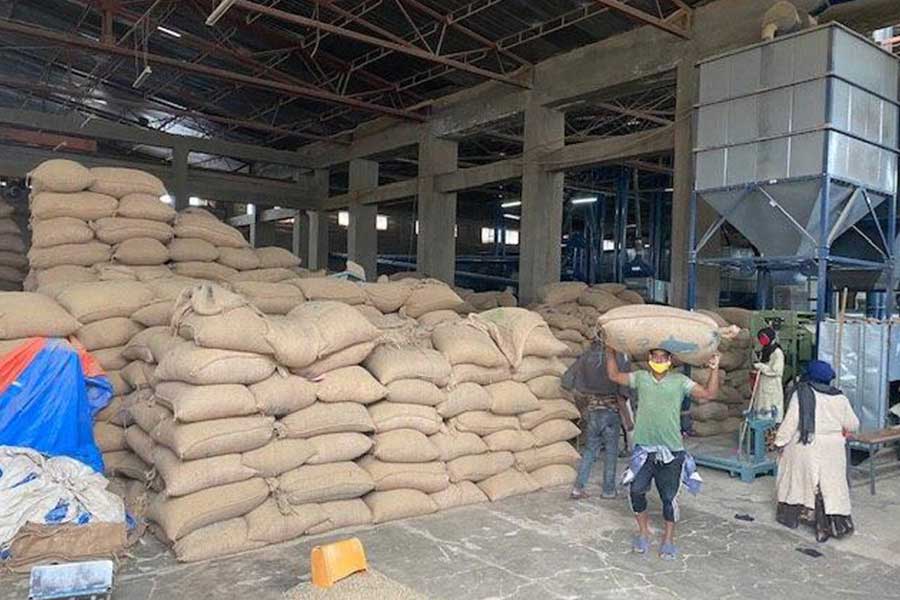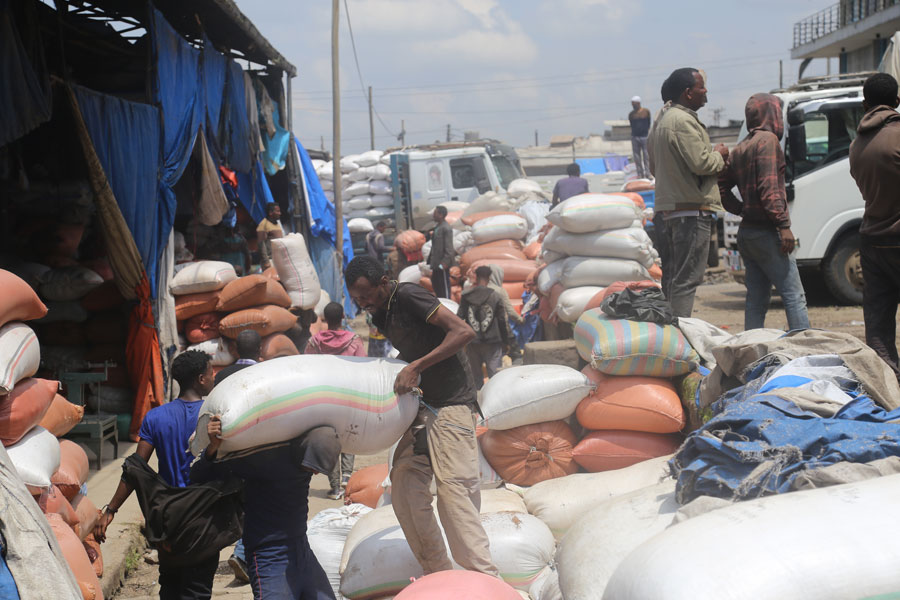
Agenda | Jul 18,2020
Jul 13 , 2024
By MUNIR SHEMSU ( FORTUNE STAFF WRITER )
Consumers are wrestling with a sharp increase in the prices of pasta and macaroni, commodities that have surged by an average of nearly 12 Br across markets. The spike comes days after the ratification of an amended VAT proclamation, forcing domestic producers to pass on the new levies to consumers, resulting in a 10pc increase for a pack.
Small family-run businesses are particularly affected.
Zebib Restaurant, a modest eatery on Sierra Leone Street in the Beqlo B'et area, has removed spaghetti from its menu. Owner Adanech Gurara, who typically serves around two dozen packs of 500g spaghetti to daily labourers from nearby construction sites, has found the cost too prohibitive.
"Every ingredient has soared," Adanech told Fortune.
Running the small business with her daughter, she now relies on offering coffee and small biscuits to cover household expenses. She struggles to keep up with rising costs, as nearly every essential item, including teff, cooking oil, and flour, has increased in price over the past year.
Every ingredient has soared
"It is getting harder by the day," she lamented.
The Ethiopian Millers Association, comprising 200 members, attributed the recent price hikes solely to the new tax levies. General Manager Tesfaye Haile recalled appealing to Ministry of Finance officials during a meeting with industry representatives as the draft amendment was under discussion in Parliament.
"We had objections to the entire reasoning," Tesfaye told Fortune.
He cited arguments that rising prices over the past few years proved that the exemptions were ineffective. According to Tesfaye, it was inevitable that prices would increase as the nearly 30 domestic producers complied with the new levies.
"They've to obey the law after all," he stated.
Over the past two weeks, prices for most locally produced pasta varieties have soared by an average of 180 Br a box, as the tax is known as a consumer tax.
According to a policy briefing by the Urban-Brookings Tax Policy Centre, VAT, as a consumption tax, inevitably impacts lower-income households, which spend rather than save more of their income. Economists like Arega Shumete (PhD) agree. He said firms will transfer costs to consumers regardless of the levy’s nature. He observed tight monetary policies targeting price stability conflict with fiscal policies exacerbating inflation.
"Consumers will shoulder the burden," Arega told Fortune.
The economist noted that government expenditures predicated on tax revenue often disproportionately favour firms instead of consumers compelled to pay extra. He argued that fixed-income earners, whose earnings do not reflect inflationary pressures, feel the sharp blows.
Indirect taxation accounts for 24pc of the federal tax revenue target of 502 billion Br, with VAT expected to contribute around 100 billion Br. The Food & Beverage Research & Development Center, led by Habatamu Taye, recalled that items such as flour, pasta, and macaroni received exemptions three years ago to address inflationary pressures during the COVID-19 pandemic.
"We believe that locally produced food outputs should be incentivised," Habatamu told Fortune, stating the importance of boosting the competitiveness of domestic food production.
The 21-year-old VAT law, initially introduced as part of tax reforms, sought to beef up government revenues to stabilise the economy. The law entailed a 15pc levy on various items.
However, the VAT amendments have raised concerns from several lobby groups as they made their way to the voting floor under the Standing Committee for Plan, Budget & Financial Affairs. While the VAT levies have expanded to include mobile money operators, e-commerce businesses, public transport with fewer than eight people, and utilities like electricity and water supply, the most severe inflationary impact has landed on grains.
Tedla Hailegiorgis, CEO of Chilalo Food Complex, a major food processing company behind the household brand 'OK,' noted no increase in production costs across the industry, with most inputs having stabilised in supply over the past year.
"The only new thing is the tax," Tedla told Fortune. "We started implementing it within a week."
Chilalo Food Complex operates out of a 15,000Sqm plant in Assela Town, Oromia Regional State, and can produce around 3,000kg of pasta and 2,000kg of macaroni daily. Tedla acknowledged that the price increase could become difficult for lower-income households. Yet, he also anticipated that the food processing industry's large tax base would add to government revenues.
"We've already expressed our concerns over the soaring cost of living," he said.
Officials from the Addis Ababa Trade Bureau did not identify last week the source of sudden price hikes but indicated plans to continue providing affordable offerings through the two-year-old Sunday markets. Food insecurity remains a critical issue, with 83pc of the population unable to afford a balanced, nutritious diet, which costs approximately 3.7 dollars a day. Close to 25 million people are severely food insecure due to a combination of conflict, internal displacement, and logistics hurdles.
Eyob Tekalign (PhD), the state minister for Finance, defended the VAT levy during the final parliamentary hearing last month, arguing that nearly 60pc of household income is expended on food.
"If we exempt all that consumption," he argued, "we would effectively be not collecting taxes."
According to Eyob, funds for financing mechanised agriculture could only come from revenues generated through taxation, with exemptions on food restricted to essential commodities.
However, the economist Arega urged caution in imposing new taxes without adequate consideration of incentives for new investment, as this could undermine the attractiveness of engaging in risky ventures.
"A policy cocktail that addresses several macroeconomic imbalances is crucial," he said.
PUBLISHED ON
Jul 13,2024 [ VOL
25 , NO
1263]

Agenda | Jul 18,2020

Radar | Oct 02,2023

Agenda | Jan 05,2020

Fortune News | Apr 16,2022

Agenda | May 04,2025

Fortune News | May 15,2024

Fortune News | Dec 11,2021

Radar | Oct 01,2022

Fortune News | May 15,2021

Fortune News | Aug 19,2023

Dec 22 , 2024 . By TIZITA SHEWAFERAW
Charged with transforming colossal state-owned enterprises into modern and competitiv...

Aug 18 , 2024 . By AKSAH ITALO
Although predictable Yonas Zerihun's job in the ride-hailing service is not immune to...

Jul 28 , 2024 . By TIZITA SHEWAFERAW
Unhabitual, perhaps too many, Samuel Gebreyohannes, 38, used to occasionally enjoy a couple of beers at breakfast. However, he recently swit...

Jul 13 , 2024 . By AKSAH ITALO
Investors who rely on tractors, trucks, and field vehicles for commuting, transporting commodities, and f...

Oct 11 , 2025
Ladislas Farago, a roving Associated Press (AP) correspondent, arrived in Ethiopia in...

Oct 4 , 2025
Eyob Tekalegn (PhD) had been in the Governor's chair for only weeks when, on Septembe...

Sep 27 , 2025
Four years into an experiment with “shock therapy” in education, the national moo...

Sep 20 , 2025
Getachew Reda's return to the national stage was always going to stir attention. Once...